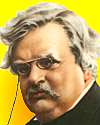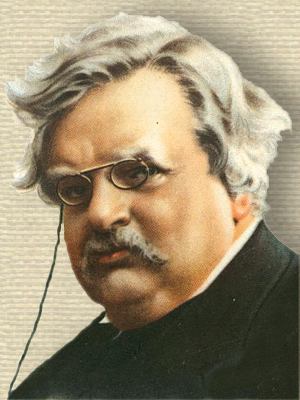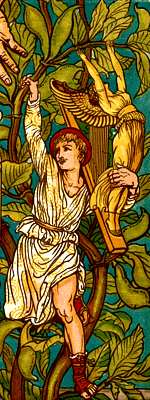 (source)
(source)
|
G. K. Chesterton
(29 May 1874 - 14 Jun 1936)
British author, critic and poet who was one of the finest writers of the 20th century. His style as a one of the great thnkers was famously brilliant, with wit, dazzling metaphors, and intriguing verbal swordplay.
|
The Logic of Elfland
by Gilbert Keith Chesterton
excerpt from ‘The Ethics of Elfland’ in Orthodoxy
[Chesterton reflects on deductive versus inductive logic, imagination and the scientific law in the witty and alliterative style for which he is known.]
[p.87] MY FIRST and last philosophy, that which I believe in with unbroken certainty, I learnt in the nursery. I generally learnt it from a nurse; that is, from the solemn and star-appointed priestess at once of democracy and tradition. The things I believed most then, the things I believe most now, are the things called fairy tales. They seem to me to be the entirely reasonable things. They are not fantasies: compared with them other things are fantastic. Compared with them religion and rationalism are both abnormal, though religion is abnormally right and rationalism abnormally wrong. Fairyland is nothing but the sunny country of common sense. It is not earth that judges heaven, but heaven that judges earth; so for me at least it was not earth that criticised elfland, but elfland that criticised the earth. I [p.88] knew the magic beanstalk before I had tasted beans; I was sure of the Man in the Moon before I was certain of the moon. This was at one with all popular tradition. Modern minor poets are naturalists, and talk about the bush or the brook; but the singers of the old epics and fables were super naturalists, and talked about the gods of brook and bush. That is what the moderns mean when they say that the ancients did not “appreciate Nature,” because they said that Nature was divine. Old nurses do not tell children about the grass, but about the fairies that dance on the grass; and the old Greeks could not see the trees for the dryads.
But I deal here with what ethic and philosophy come from being fed on fairy tales. If I were describing them in detail I could note many noble and healthy principles that arise from them. There is the chivalrous lesson of “Jack the Giant Killer”; that giants should be killed because they are gigantic. It is a manly mutiny against pride as such. For the rebel is older than all the kingdoms, and the Jacobin has more tradition than the Jacobite. There is the lesson of “Cinderella,” which is the same as that of the Magnificat-exaltavit humiles. There is the great lesson of “Beauty and the [p.89] Beast”; that a thing must be loved before it is lovable. There is the terrible allegory of the “Sleeping Beauty,” which tells how the human creature was blessed with all birthday gifts, yet cursed with death; and how death also may perhaps be softened to a sleep. But I am not concerned with any of the separate statutes of elfland, but with the whole spirit of its law, which I learnt before I could speak, and shall retain when I cannot write. I am concerned with a certain way of looking at life, which was created in me by the fairy tales, but has since been meekly ratified by the mere facts.
It might be stated this way. There are certain sequences or developments (cases of one thing following another), which are, in the true sense of the word, reasonable. They are, in the true sense of the word, necessary. Such are mathematical and merely logical sequences. We in fairyland (who ale the most reasonable of all creatures) admit that reason and that necessity. For instance, if the Ugly Sisters are older than Cinderella, it is (in an iron and awful sense) necessary that Cinderella is younger than the Ugly Sisters. There is no getting out of it. Haeckel may talk as much fatalism about that fact as he pleases: it really must be. If Jack is the son of a miller, a miller is the [p.90] father of Jack. Cold reason decrees it from her awful throne: and we in fairyland submit. If the three brothers all ride horses, there are six animals and eighteen legs involved: that is true rationalism, and fairyland is full of it. But as I put my head over the hedge of the elves and began to take notice of the natural world, I observed an extraordinary thing. I observed that learned men in spectacles were talking of the actual things that happened—dawn and death and so on—as if they were rational and inevitable. They talked as if the fact that trees bear fruit were just as necessary as the fact that two and one trees make three. But it is not. There is an enormous difference by the test of fairyland; which is the test of the imagination. You cannot imagine two and one not making three. But you can easily imagine trees not growing fruit; you can imagine them growing golden candlesticks or tigers hanging on by the tail. These men in spectacles spoke much of a man named Newton, who was hit by an apple, and who discovered a law. But they could not be got to see the distinction between a true law, a law of reason, and the mere fact of apples falling. If the apple hit Newton’s nose, Newton’s nose hit the apple. That is a true necessity: because we [p.91] cannot conceive the one occurring without the other. But we can quite well conceive the apple not falling on his nose; we can fancy it flying ardently through the air to hit some other nose, of which it had a more definite dislike. We have always in our fairy tales kept this sharp distinction between the science of mental relations, in which there really are laws, and the science of physical facts, in which there are no laws, but only weird repetitions. We believe in bodily miracles, but not in mental impossibilities. We believe that a Bean-stalk climbed up to Heaven; but that does not at all confuse our convictions on the philosophical question of how many beans make five.
Here is the peculiar perfection of tone and truth in the nursery tales. The man of science says, “Cut the stalk, and the apple will fall”; but he says it calmly, as if the one idea really led up to the other. The witch in the fairy tale says, “Blow the horn, and the ogre’s castle will fall”; but she does not say it as if it were something in which the effect obviously arose out of the cause. Doubtless she has given the advice to many champions, and has seen many castles fall, but she does not lose either her wonder or her reason. She does not muddle her head until it imagines a necessary mental [p.92] connection between a horn and a falling tower. But the scientific men do muddle their heads, until they imagine a necessary mental connection between an apple leaving the tree and an apple reaching the ground. They do really talk as if they had found not only a set of marvellous facts, but a truth connecting those facts. They do talk as if the connection of two strange things physically connected them philosophically. They feel that because one incomprehensible thing constantly follows another incomprehensible thing the two together somehow make up a comprehensible thing. Two black riddles make a white answer.
In fairyland we avoid the word “law”; but in the land of science they are singularly fond of it. Thus they will call some interesting conjecture about how forgotten folks pronounced the alphabet, Grimm’s Law. But Grimm’s Law is far less intellectual than Grimm’s Fairy Tales. The tales are, at any rate, certainly tales; while the law is not a law. A law implies that we know the nature of the generalisation and enactment; not merely that we have noticed some of the effects. If there is a law that pick-pockets shall go to prison, it implies that there is an imaginable mental connection between the idea of prison and the [p.93] idea of picking pockets. And we know what the idea is. We can say why we take liberty from a man who takes liberties. But we cannot say why an egg can turn into a chicken any more than we can say why a bear could turn into a fairy prince. As ideas, the egg and the chicken are further off each other than the bear and the prince; for no egg in itself suggests a chicken, whereas some princes do suggest bears. Granted, then, that certain transformations do happen, it is essential that we should regard them in the philosophic manner of fairy tales, not in the unphilosophic manner of science and the “Laws of Nature.” When we are asked why eggs turn to birds or fruits fall in autumn, we must answer exactly as the fairy godmother would answer if Cinderella asked her why mice turned to horses or her clothes fell from her at twelve o’clock. We must answer that it is magic. It is not a “law,” for we do not understand its general formula. It is not a necessity, for though we can count on it happening practically, we have no right to say that it must always happen. It is no argument for unalterable law (as Huxley fancied) that we count on the ordinary course of things. We do not count on it; we bet an it. We risk the remote possibility of a miracle as [p.95] we do that of a poisoned pancake or a world-destroying comet. We leave it out of account, not because it is a miracle, and therefore an impossibility, but because it is a miracle, and therefore an exception. All the terms used in the science books, “law, “necessity,” “order,” “tendency,” and so on, are really unintellectual, because they assume an inner synthesis which we do not possess. The only words that ever satisfied me as describing Nature are the terms used in the fairy books, “charm,” “spell,” “enchantment.” They express the arbitrariness of the fact and its mystery. A tree grows fruit because it is a magic tree. Water runs downhill because it is bewitched. The sun shines because it is bewitched.
I deny altogether that this is fantastic or even mystical. We may have some mysticism later on; but this fairy-tale language about things is simply rational and agnostic. It is the only way I can express in words my clear and definite perception that one thing is quite distinct from another; that there is no logical connection between flying and laying eggs. It is the man who talks about “a law” that he has never seen who is the mystic. Nay, the ordinary scientific man is strictly a sentimentalist. He is a sentimentalist in this essential [p.96] sense, that he is soaked and swept away by mere associations. He has so often seen birds lay and lay eggs that he feels as if there must be some dreamy, tender connection between the two ideas, whereas there is none. A forlorn lover might be unable to dissociate the moon from lost love; so the materialist is unable to dissociate the moon from the tide. In both cases there is no connection, except that one has seen them together. A sentimentalist might shed tears at the smell of apple-blossom, because, by a dark association of his own, it reminded him of his boyhood. So the materialist professor (though he conceals his tears) is yet a sentimentalist, because, by a dark association of his own, apple-blossoms remind him of apples. But the cool rationalist from fairyland does not see why, in the abstract, the apple tree should not grow crimson tulips; it sometimes does in his country.
This elementary wonder, however, is not a mere fancy derived from the fairy tales; on the contrary, all the fire of the fairy tales is derived from this. Just as we all like love tales because there is an instinct of sex, we all like astonishing tales because they touch the nerve of the ancient instinct of astonishment. This is proved by the fact that when we are very [p.96] young children we do not need fairy tales: we only need tales. Mere life is interesting enough. A child of seven is excited by being told that Tommy opened a door and saw a dragon. But a child of three is excited by being told that Tommy opened a door. Boys like romantic tales; but babies like realistic tales-because they find them romantic. In fact, a baby is about the only person, I should think, to whom a modern realistic novel could be read without boring him. This proves that even nursery tales only echo an almost pre-natal leap of interest and amazement. These tales say that apples were golden only to refresh the forgotten moment when we found that they were green. They make rivers run with wine only to make us remember, for one wild moment, that they run with water. I have said that this is wholly reasonable and even agnostic. And, indeed, on this point I am all for the higher agnosticism; its better name is Ignorance. We have all read in scientific books, and, indeed, in all romances, the story of the man who has forgotten his name. This man walks about the streets and can see and appreciate everything; only he cannot remember who he is. Well, every man is that man in the story. Every man has forgotten who he is. One may [p.97] understand the cosmos, but never the ego; the self is more distant than any star. Thou shalt love the Lord thy God; but thou shalt not know thyself. We are all under the same mental calamity; we have all forgotten our names. We have all forgotten what we really are. All that we call common sense and rationality and practicality and positivism only means that for certain dead levels of our life we forget that we have forgotten. All that we call spirit and art and ecstasy only means that for one awful instant we remember that we forget.
Chesterton's topic is nothing less than the fundamental contrast between deductive logic, true of all possible worlds, and inductive logic, capable only of telling us how we may reasonably expect this world to behave. Let us hasten to add that Chesterton's analysis is in full agreement with the views of modern logicians. Perhaps his "test of the imagination" is not strictly accurate--who can "imagine" the four-dimensional constructions of relativity?-but in essence his position is unassailable. Logical and mathematical statements are true by definition. They are "empty tautologies," to use a current phrase, like the impressive maxim that there are always six eggs in half a dozen. Nature, on the other hand, is under no similar constraints. Fortunately, her "weird repetitions," as GK calls them, often conform to surprisingly low-order equations. But as Hume and others before Hume made clear, there is no logical reason why she should behave so politely.]
- Science Quotes by G. K. Chesterton.






